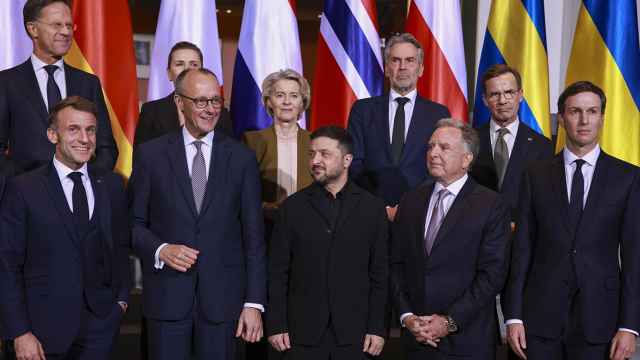Euroclear Bank, operator of the world's largest system for settling bonds, plans to connect with Russia's domestic debt market by year-end, a move investors say could cause local and international yields to converge.
Talks on enabling investors with a Euroclear account to buy and sell Russian domestic bonds without the need for a local trading account are "progressing nicely" and a service is planned by the end of the year, Euroclear spokesman Martin Gregson said from Brussels on Wednesday.
"A Euroclear link would be a revolution," Dmitry Dudkin, head of fixed-income research in Moscow at UralSib Financial, said by e-mail. "The yields of OFZs and the ruble eurobond would converge."
Russian government debt that can't be traded through Euroclear yields 88 basis points, or 0.88 percentage point, more than similar-maturity ruble eurobonds.
The plan with Euroclear would probably spur investors to sell ruble eurobonds in favor of OFZs, said Kieran Curtis, who helps manage $2.5 billion of emerging market debt at Aviva Investors in London, a unit of Britain's second-largest insurer.
"Limited foreign investor participation in OFZs reflects to a large extent the difficulties of opening fixed-income accounts in Russia," Curtis said. "If investors can settle their bond purchases in Euroclear this obstacle is instantly removed."
RusHydro, Russia's biggest producer of renewable energy, is one of seven issuers of ruble bonds that can be settled and traded through Euroclear or Clearstream. RusHydro's notes due in 2015 that are accessible to foreign investors yielded 7.92 percent Wednesday, 16 basis points less than its local bonds puttable in 2016.
Investors wanting to buy and sell Russia's domestic OFZs currently have to set up a local brokerage and custody account, a process that can take years, Dudkin said. Stricter client identification requirements for investors trading OFZs also "effectively prevent" foreigners from buying and selling the notes, according to Maxim Tishin, a fund manager at UFG Asset Management.
The yield spread on Russian bonds is 96 basis points below the average for emerging markets, down from a 15-month high of 105 in February 2010, according to JPMorgan Chase indexes.
The MICEX Exchange plans to make it easier for investors to trade both corporate and government bonds by putting them on the same platform from the start of next year, bourse president Ruben Aganbegyan said in London on May 31. The same rules will apply to government and corporate bonds, allowing OFZs to be traded over-the-counter, Aganbegyan said.
The government will continue to sell OFZs even as its budget deficit shrinks, in order to build the local market, Deputy Finance Minister Sergei Storchak said May 31. "The government is taking on the expense of developing the market," he said.
Russia has sold 478 billion rubles ($17.1 billion) of local-currency bonds this year, according to Central Bank data, and is targeting a record 1.74 trillion rubles of issuance.
"This will provide a major boost to interest in OFZs," Luis Costa, an emerging markets strategist in London at Citigroup, said Wednesday. "Spreads to the ruble international bond may just disappear."
A Message from The Moscow Times:
Dear readers,
We are facing unprecedented challenges. Russia's Prosecutor General's Office has designated The Moscow Times as an "undesirable" organization, criminalizing our work and putting our staff at risk of prosecution. This follows our earlier unjust labeling as a "foreign agent."
These actions are direct attempts to silence independent journalism in Russia. The authorities claim our work "discredits the decisions of the Russian leadership." We see things differently: we strive to provide accurate, unbiased reporting on Russia.
We, the journalists of The Moscow Times, refuse to be silenced. But to continue our work, we need your help.
Your support, no matter how small, makes a world of difference. If you can, please support us monthly starting from just $2. It's quick to set up, and every contribution makes a significant impact.
By supporting The Moscow Times, you're defending open, independent journalism in the face of repression. Thank you for standing with us.
Remind me later.





